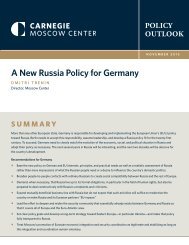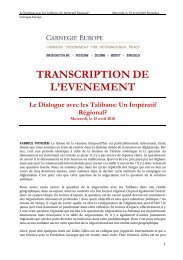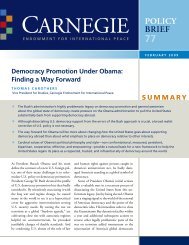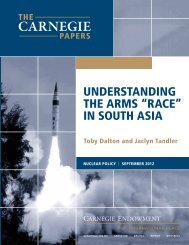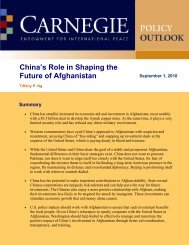An Introduction - Carnegie Endowment for International Peace
An Introduction - Carnegie Endowment for International Peace
An Introduction - Carnegie Endowment for International Peace
You also want an ePaper? Increase the reach of your titles
YUMPU automatically turns print PDFs into web optimized ePapers that Google loves.
10 | democracy challenged<br />
Semi-authoritarian regimes demonstrate, however, that liberalization<br />
can also free ideas and trigger political processes that make democratization<br />
difficult, if not impossible.<br />
Policy Challenges<br />
From the point ofview ofpolicy makers in the United States and other<br />
democratic countries, the most immediate challenge posed by semiauthoritarian<br />
regimes is a policy one: How should such regimes be<br />
dealt with? Should the United States try to <strong>for</strong>ce democratization programs<br />
on Egypt, an important U.S. ally in the Middle East, although<br />
the Egyptian government would resist and the programs might even<br />
prove destabilizing? How should the international community react<br />
to Heydar Aliyev’s plan to anoint his son as his successor as president<br />
ofAzerbaijan, as ifthe country were a monarchy rather than a republic?<br />
What action is warranted when Venezuela starts slipping back<br />
from democracy to a semi-authoritarian populism? How can donors<br />
facilitate Croatia’s second transition, the one from semi-authoritarianism?<br />
But there is another layer ofissues raised by semi-authoritarian<br />
regimes, which may appear abstract when first <strong>for</strong>mulated but are<br />
actually very important to the outcome ofdemocracy promotion policies.<br />
Generally, these issues can be organized under the question, Why<br />
do semi-authoritarian regimes come into existence? Is it because of<br />
bad leaders (support ef<strong>for</strong>ts to vote them out of office), weak institutions<br />
(set up a capacity-building program), or a disorganized civil society<br />
incapable ofholding the government accountable (fund and train<br />
nongovernmental organizations)? Or is it because there are underlying<br />
conditions that seriously undermine the prospects <strong>for</strong> democracy<br />
(and what can be done about underlying conditions)? Even more fundamentally,<br />
does the proliferation of semi-authoritarian regimes indicate<br />
that the assumptions about democratic transitions that undergird<br />
assistance programs need rethinking?<br />
As long as the United States and other industrial democracies continue<br />
funding democracy assistance programs, questions about the<br />
nature ofsemi-authoritarian regimes and the mechanisms ofdemocratic<br />
transitions are not abstract, but have a direct bearing on policy




